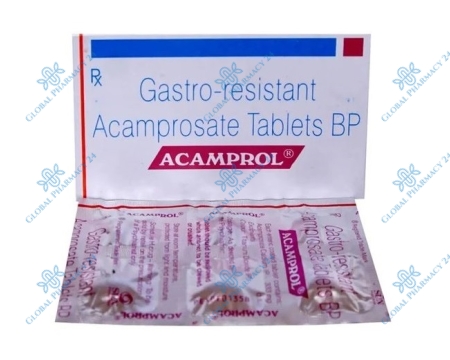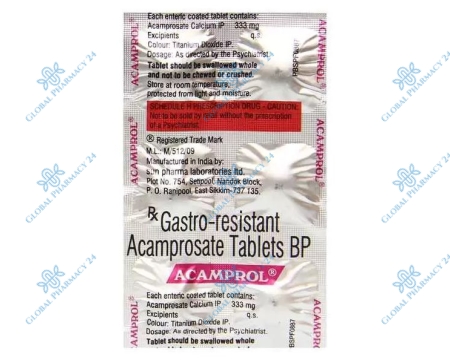| Characteristic | Detail |
|---|---|
| Active Ingredient | Acamprosate Calcium |
| Dosage Forms | 333 mg Delayed-Release Tablets |
| Recommended Dosage | Two tablets three times a day |
| Duration of Treatment | As prescribed by healthcare provider, usually several months |
| Primary Use | To reduce alcohol craving and maintain abstinence in alcohol-dependent patients |
| Mechanism of Action | Modulates neurotransmitter systems related to alcohol dependence |
Understanding Acamprol: Its Purpose and Composition
Acamprol, known generically as Acamprosate Calcium, is a pivotal medication designed to assist individuals recovering from alcohol dependence by reducing the craving for alcohol. Its active ingredient, Acamprosate Calcium, works by restoring the chemical balance in the brain that is disrupted by long-term alcohol use. This restoration helps in reducing the desire to consume alcohol, making it easier for individuals to maintain abstinence.
The composition of Acamprol is specifically tailored to target the brain's neurotransmitters, which play a significant role in the addiction cycle. By modulating these neurotransmitter systems, Acamprol aids in the psychological recovery process, complementing other treatment modalities like counseling and support groups. Its effectiveness is heightened when used as part of a comprehensive treatment plan aimed at long-term recovery.
How Acamprol Works: Controlling Alcohol Cravings
Acamprol operates by interacting with the glutamate and GABA neurotransmitter systems in the brain, which are often imbalanced in individuals with alcohol dependency. This interaction helps to stabilize brain chemistry and reduce the physical and psychological cravings for alcohol, providing a supportive backdrop for other therapeutic interventions and facilitating a smoother recovery journey.
Making Acamprol Work for You: Correct Usage
For Acamprol to be most effective, it must be used according to the prescribed guidelines. Adherence to dosage instructions is crucial, as is the timing of the medication intake. Acamprol's role in recovery is maximized when it is part of a broader treatment plan, which may include therapy, lifestyle changes, and support systems. Its use is most beneficial when initiated as soon as possible after the cessation of alcohol intake and continued throughout the recovery process to help maintain abstinence.
Engagement with a healthcare provider throughout the treatment period allows for adjustments and monitoring of the medication's efficacy and tolerability. This collaborative approach ensures that Acamprol is contributing positively to the recovery journey, allowing for adjustments as needed to optimize treatment outcomes.
Dosage Guidelines for Acamprol
The standard dosage of Acamprol involves taking two 333 mg delayed-release tablets three times a day. This regimen may vary based on individual needs and response to treatment, highlighting the importance of following a healthcare provider's specific recommendations. Regular consultations allow for dosage adjustments to ensure the highest efficacy of the medication with minimal side effects.
Key Points to Remember When Using Acamprol
Key considerations when taking Acamprol include maintaining a consistent medication schedule, avoiding alcohol consumption, and engaging in additional recovery activities such as counseling. Monitoring for side effects and reporting them to a healthcare provider are also critical to ensure safe and effective use of the medication.
Uncovering the Side Effects of Acamprol
While Acamprol is generally well-tolerated, some individuals may experience side effects. These can range from mild to more severe, although severe side effects are less common. Awareness and prompt reporting of any adverse effects to a healthcare provider are crucial for managing and potentially mitigating these side effects. It's important for patients to be informed about the potential side effects as part of their decision-making process in starting treatment with Acamprol.
Most side effects are manageable and tend to diminish over time as the body adjusts to the medication. However, any persistent or bothersome symptoms should be discussed with a healthcare provider to ensure they do not indicate a more serious condition or require a change in treatment strategy.
Commonly Reported Side Effects of Acamprol
Common side effects of Acamprol include gastrointestinal disturbances such as diarrhea, nausea, and vomiting, as well as headaches and dizziness. These are typically mild and often resolve with continued use of the medication.
Rare Side Effects: Information You Should Know
Rare side effects of Acamprol may include changes in mood or behavior, severe gastrointestinal symptoms, or allergic reactions. While these are uncommon, immediate medical attention should be sought if they occur.
Proper Storage and Handling of Acamprol
Storing Acamprol correctly is essential to maintain its effectiveness. The medication should be kept in a cool, dry place away from direct sunlight and moisture. Proper storage ensures the medication's stability and efficacy over time, supporting its role in the treatment plan.
Handling Acamprol with care, including keeping it out of reach of children and pets, is also important. Disposal of expired or unused medication should be done responsibly, following guidelines to prevent harm to others and the environment.
How to Store Acamprol Safely
Acamprol should be stored at room temperature, away from excess heat and moisture. The original packaging is designed to protect the tablets, so keeping them in their bottle until use is recommended.
Precautions to Consider When Handling Acamprol
When handling Acamprol, ensure the cap is securely closed to prevent moisture entry. Do not use the medication past its expiration date, and consult a pharmacist or a medical professional for proper disposal methods.
Exploring the Benefits of Acamprol
- Reduces cravings for alcohol, aiding in maintaining abstinence.
- Supports the psychological aspect of recovery by stabilizing brain chemistry.
- Can be used as part of a comprehensive treatment plan including counseling and support groups.
- Generally well-tolerated with manageable side effects.
Understanding the Potential Downsides of Acamprol
- May cause side effects such as gastrointestinal disturbances and headaches.
- Requires adherence to a strict dosage schedule, which may be challenging for some individuals.
- Effectiveness can vary based on individual factors, including the duration and severity of alcohol dependency.
- Needs to be used in conjunction with other treatment modalities for best results.
In conclusion, Acamprol represents a valuable option in the arsenal against alcohol dependence, offering a means to reduce cravings and support recovery. Its role, however, is as part of a broader strategy that includes psychological support and lifestyle modifications. By understanding its benefits and potential drawbacks, patients and their healthcare providers can better navigate the complexities of recovery to find a path that is both effective and sustainable.
For those considering Acamprol, it's crucial to have open discussions with healthcare professionals to fully understand its implications, how it fits into your overall treatment plan, and to tailor its use to your specific needs. With the right approach, Acamprol can be an effective component of a comprehensive strategy aimed at overcoming alcohol dependence and fostering long-term health and well-being.
FAQs Acamprol
1. What is Acamprol used for?
Acamprol is used to help people who have alcohol dependence problems by reducing the craving for alcohol. It is often used as part of a comprehensive treatment program that includes counseling and support.
2. How does Acamprol work?
Acamprol works by restoring the balance of certain chemicals in the brain that are disrupted by long-term alcohol use. It helps to reduce the craving for alcohol and can make it easier for people to stop drinking or cut down on their alcohol consumption.
3. What are the common side effects of Acamprol?
Common side effects of Acamprol include headache, nausea, diarrhea, dizziness, and insomnia. These side effects are usually mild and temporary, but if they persist or worsen, it's important to consult a healthcare professional.
4. How should I take Acamprol?
Acamprol is typically taken orally, usually in the form of tablets. The dosage and frequency of administration will depend on your individual circumstances and should be determined by your doctor. It's important to follow the instructions provided by your healthcare provider and to not exceed the recommended dosage.



















